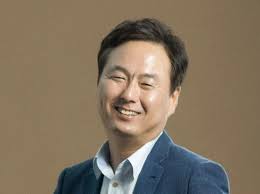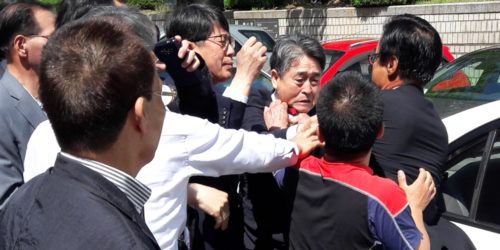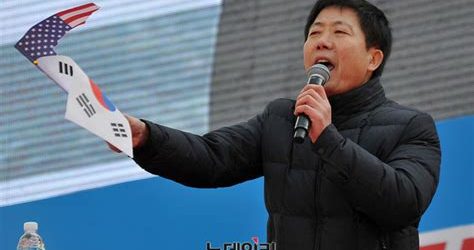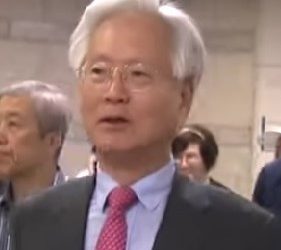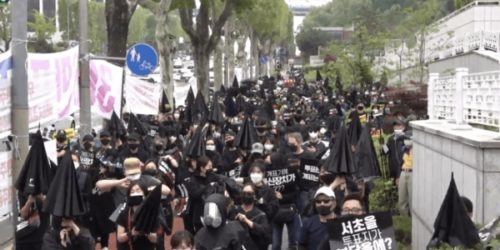Declaration by the Professors’ Solidarity of Freedom and Justice: Election Fraud Suspicions Should Be Resolved Quickly
2020-4-30, Declaration by the Professors’ Solidarity of Freedom and Justice
Election Fraud Suspicions should be Resolved Quickly and Clearly, Based on the “Principle of People’s Sovereignty”
Note: The Professors’ Solidarity of Freedom and Justice (JeongGyoMo) is a civil society group in South Korea, having 6,200 members who are full-time professors in more than 370 universities and colleges across the country. The solidarity issued a declarations regarding the matter of fraud in the April 15, 2020 general election of Korea. This is one of the declarations.
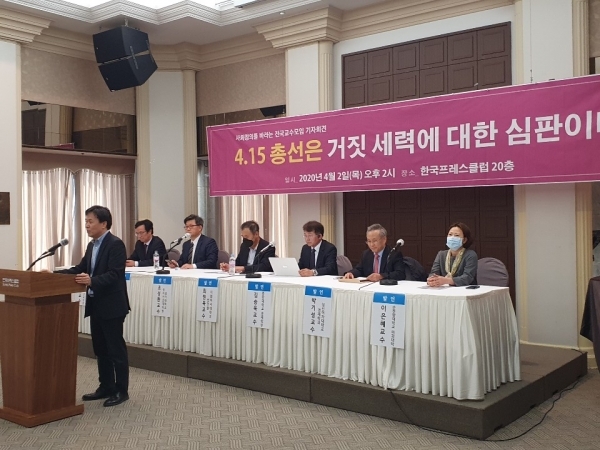
In a democratic state, elections are the basic process of the exercise of sovereignty by the people, and the results of the elections are the source of proof that the government and the National Assembly have been duly delegated sovereignty from the people. We are grateful to the public officials who made a commitment to the management of the 21st general election, despite the difficult circumstances of the Corona 19 crisis, and to the people who made their dedication in the voting and ballot counting process.
In spite of such national hard work, if suspicion of serious problems and loopholes in the voting and counting process is specifically presented, it is necessary to restore public trust by verifying it, which is also needed for the next election. The results of this general election, in particular, have been unprecedented, and pointed out by statistics experts as almost impossible regarding the results of the pre-voting, and this is causing massive public suspicion. The difference between pre-voting and same-day voting occurs generally in favor of candidates for a specific party to the same extent as the probability of winning lotto several times in a row in constituencies called battlefields, and this difference occurs uniformly across the country, excluding a specific geographical area. As a result, there are many suspicious eyes that the results of the votes on the day were changed by the results of the pre-voting. In addition, fundamental suspicions have also been raised, including the possibility of “election manipulation” that cannot be easily resolved in terms of mistakes in election management.
Not so long ago, the majority of the people did not think that manipulation of public opinion on the Internet, represented by the “Druking case” in the last presidential election, would be possible by a small number of people, but the court ruling confirmed that this manipulation had actually happened. In the case of the electronic counting system that we developed and exported to foreign countries, the possibility of manipulation has emerged in some countries, and there have also been reports of cases where a decision to ban its use has been made.
In this situation, the possibility of manipulating the electronic counting machine program that aggregates the results of pre-voting in favor of the ruling party has been raised along with detailed analysis data, which shakes the trust in the system and operation. In order to secure the legitimacy of the government and the National Assembly elected, it is necessary to resolve the distrust of the people. There may be a crisis of legitimacy that the democratic republic cannot recover as there are concerns that such suspicions will persist or amplify.
Accordingly, the Central Executive Committee, the representative body of the Professors’ Solidarity for Freedom and Justice, submits that raised national suspicions in the votes for the 21st general elections are not a so-called ‘conspiracy theory’ level issue, but a matter that should be resolved quickly, concretely and accurately from the standpoint of the ‘principle of people’s sovereignty’, and demands the followings:
First, the Central Election Commission must strictly disclose all suspicions of this general election, respecting the principle of people’s sovereignty and the citizens’ right to know. Since the Commission holds all the evidence related to the legitimacy of the election affairs, the responsibility for final proof of the justification rests with it, not with the party raising the suspicion. As long as considerable distrust of the extreme counting statistics that cannot be found in previous elections is presented along with specific evidence, the Central Election Commission should not totally rely on the judicial proceedings, but should transparently proceed with the verification procedure of its own as to even a few constituencies. It is strongly demanded to stop further division of national opinion.
Second, the parties to this election, the opposition parties and those individuals who have run for public office elections, should be aware that their duty is to resolve even the public’s suspicion of election fraud. It is a politician’s abandonment of duty, who calculates factional infidelity and disfavor, ignores national suspicions, and leaves the national opinion to continue to be divided by unconfirmed facts. The National Assembly should immediately initiate the Administrative Committee procedure to investigate allegations related to the election, and candidates for the general election must go through a legal procedure to investigate allegations of voting and counting.
Third, the prosecution, who is the protector of the constitutional order, must engage in a prompt and strict investigation of the accusations of civic groups and resolve any doubts. Investigations should be conducted on those who actually created a checkup program for vote counting and operated it for election management, and the possibility of external hacking should be investigated. The courts, the government, and the National Assembly should make every effort to implement judicial judgments and administrative and legislative follow-up measures according to the results of investigations.
Fourth, the media, civic groups, and intellectuals should fulfill their roles as rational “public opinion creators” who fairly support the resolution of the suspicion, not as a stimulator of national division over election suspicion. Faced with the truth that the current suspicion is not irrelevant to the problems inherent in the electoral system itself, such as pre-election and electronic ballot counting, attention needs to be paid to the reform of the electoral system that guarantees not only the strictness and fairness of the election, but also the effectiveness and transparency of voting and ballot counting management. It should be guided to reflect it in the process of revising the election law in the future. In particular, in the case of electronic counting, it is a system that guarantees the convenience of counting, but the reality is that the possibility of manipulation of results cannot be completely excluded. When the German Supreme Court ruled electronic voting unconstitutional in 2009, it held that all essential steps in the election process and decisions regarding outcomes were in line with democratic principles only if they could be verified by ordinary voters with no technical knowledge. This ruling example has great implications. The Netherlands also quit the electronic system after there was a demonstration in 2006 showing the possibility of external intervention in electronic election system that was broadcasted by a broadcasting company.
For reasons of administrative convenience, matters that have sufficient room to undermine the principle of people’s sovereignty should not be passed without verification. The government, politics, and civil society should proceed from the work of establishing principles to restore the legitimacy and social integration of the constitution and democratic system of the Republic of Korea.
April 30, 2020
The Central Executive Committee,
The Professors’ Solidarity for Freedom and Justice, Republic of Korea


